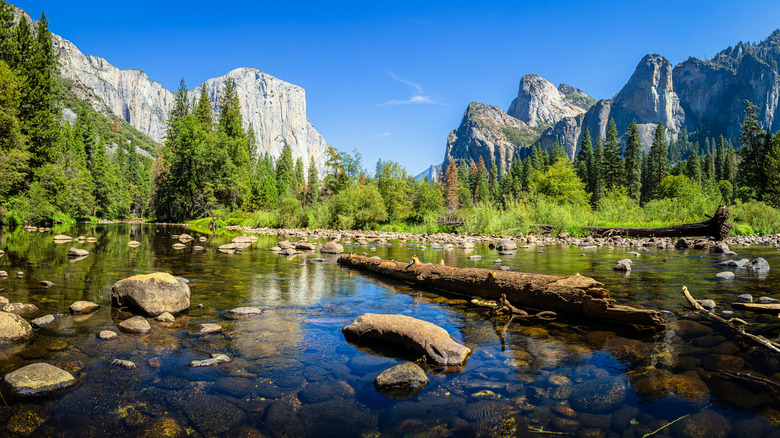Northern California is perhaps most well-known for its Golden Gate Bridge, which should be on everyone’s California bucket list. Plus, San Francisco has its own charm and culture that tourists and residents alike fall in love with. From its cable cars and steep hills to its tasty seafood, this city is definitely worth spending time in. However, if you want to look beyond San Francisco and long for nature, Yosemite National Park is where you need to go.
It’s a 3-hour drive from the city, so you can cram in a whole day of activities if you’re smart about it. That way, you can breathe fresh air without too much disruption from your Northern California trip. To ensure you have the best experience possible and that you make the most of your time, we’ve rounded up the top Yosemite National Park highlights according to reviews from Google, YosemiteHikes, and AllTrails. Here are the national park activities you shouldn’t skip.
Go up to Tunnel View
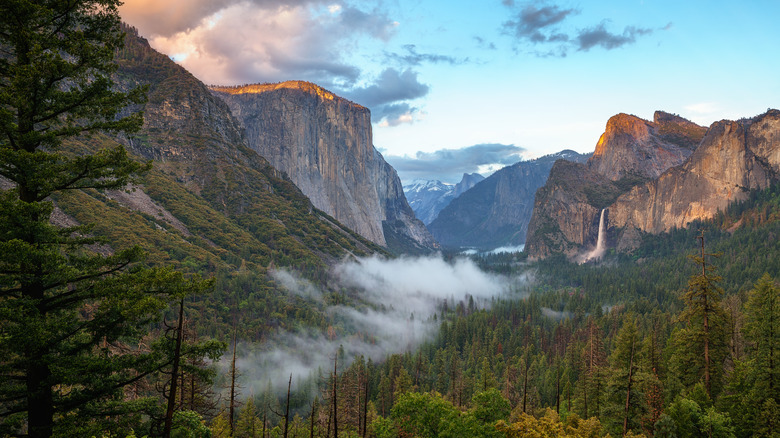
Since getting to Yosemite National Park takes three hours, we suggest you get an early morning start. This is especially true if you want to catch a gorgeous sunrise that’ll make you speechless. The ideal place to experience this is at Tunnel View, which you can access from State Highway 41. Tunnel View gives you a comprehensive view of many parts of the park, which can help you get your bearings. For example, from this viewpoint, you can see three magnificent natural wonders — El Capitan, Half Dome, and Bridalveil Fall.
What’s impressive is that the scenery changes with each season, so even if you’ve been up here before, it’ll have a different appearance if you’re visiting during another part of the year. If you’re a fan of the landscape photographer Ansel Adams, you’ll have a greater appreciation for Tunnel View. You’ll get to gaze upon the same scene he did when capturing Yosemite National Park’s beauty almost 100 years ago.
Explore Yosemite Valley
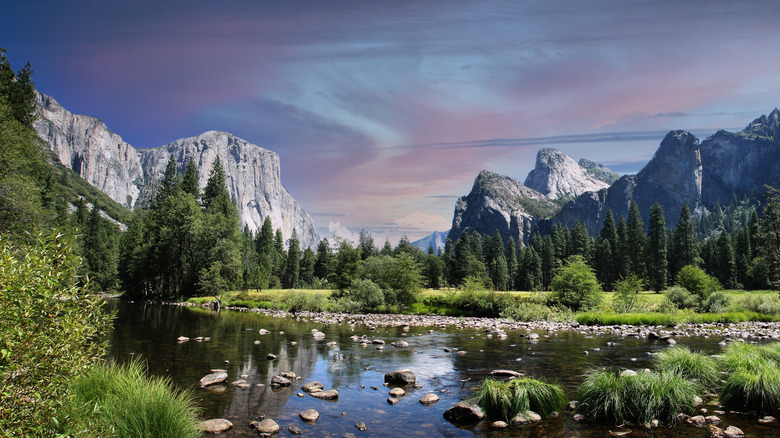
Once you get your fill of the gorgeous scenery at Tunnel View, hurry over to Yosemite Valley. This is the No. 1 spot visitors flock to, so if you don’t go early in the morning, you’ll have a difficult time. Not only will it be crowded, but parking will be impossible after 9:00 a.m., and you’ll have to look elsewhere. This means those not taking a bus into Yosemite National Park will need to plan accordingly. Expect significant delays during the summer, when it can take two to three hours to get in. If you can, visit during October instead; not only will there be fewer people, but you may also get a light dusting of snow.
Yosemite Valley encompasses several large areas in the park; Valley View is technically one. Others include El Capitan Meadow and Sentinel Meadow. As you may have guessed, you can see meadows, the Merced River, and the famous granite cliffs, and we’ll tell you more about specific places to stop in later. The valley is pretty accessible, meaning you can walk everywhere. However, you can opt for bike rentals to get around quicker. Do note that these are only available between early April and the end of October.
Visit Yosemite Village and the Visitor Center
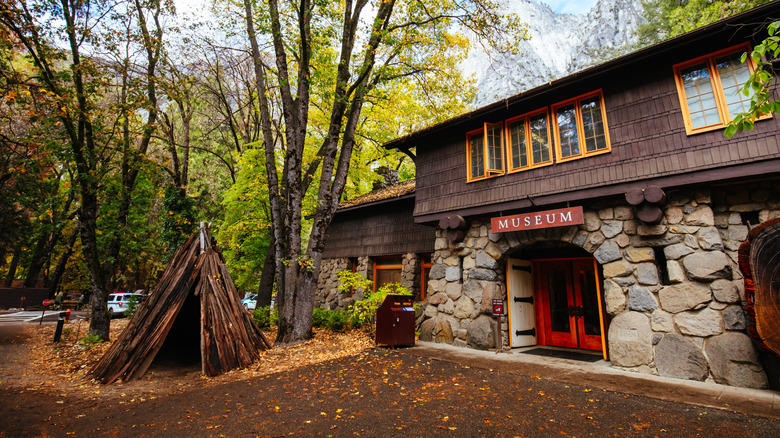
Filedimage/Getty Images
Yosemite Village is the central hub of Yosemite National Park and has a beautiful rustic look. It’s perfect to rest and refuel here since there are the Village Store, Degnan’s Kitchen, The Loft at Degnan’s, and Village Grill Deck to grab lunch at. On TripAdvisor, user Frank Sories says, “The store was well-stocked for such an out-of-the-way location. We didn’t eat at the deli, but it was a very clean and cheerful place with a fire burning and people enjoying coffee.” If you bring lunch with you, make sure to pack food safely to avoid attracting bears.
In addition, you’ll find the Ansel Adams Gallery, the Yosemite Museum, the Wilderness Center, and the Visitor Center here. If you aren’t in a hurry, we’d suggest checking out the first two buildings to learn more about the area. You’ll need to stop at the Wilderness Center to get a permit to go backpacking or hike the southbound John Muir Trail or Half Dome. Lastly, a stop at the Visitor Center can be highly educational, as you can take pamphlets and get some information about the surroundings from the helpful staff members.
Look around the Ansel Adams Gallery
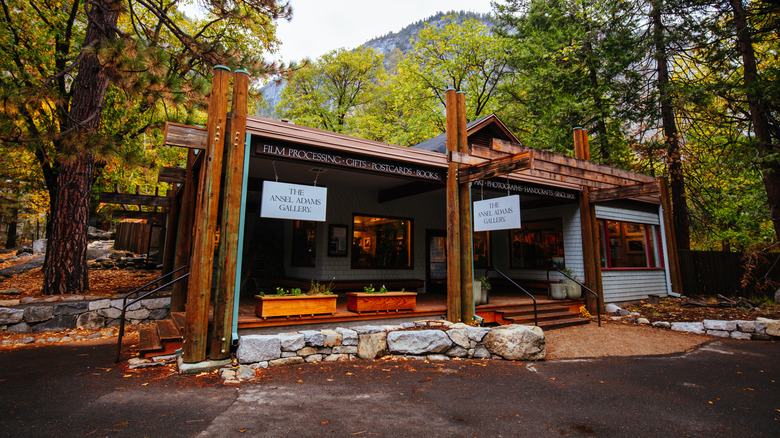
FiledIMAGE/Shutterstock
Remember how we said Ansel Adams focused his photographs on Yosemite National Park? Whether you’ve never heard of him or are a huge fan, it’s worth a look around the Ansel Adams Gallery while you’re in Yosemite Village. You can admire his striking black-and-white photographs of the area without making the trek to those points yourself. If you’re in Yosemite National Park on a Tuesday or Thursday, the gallery offers free walking tours. It takes 10 people max on each walk and departs at 9:00 a.m. You’ll learn useful information about capturing nature on your camera, whether it’s analog or digital.
When you’re done, bring a memento home by shopping in the gallery. You’ll find a diverse selection of rare books, handmade crafts, fine art prints, and an exceptional collection of original Ansel Adams photographs. You just might be a proud owner of a fantastic image in the future! The gallery also features works of Yosemite from other photographers, meaning you can bring home a whole collection of prints to remember your time in the park.
Hike to Lower Yosemite Falls
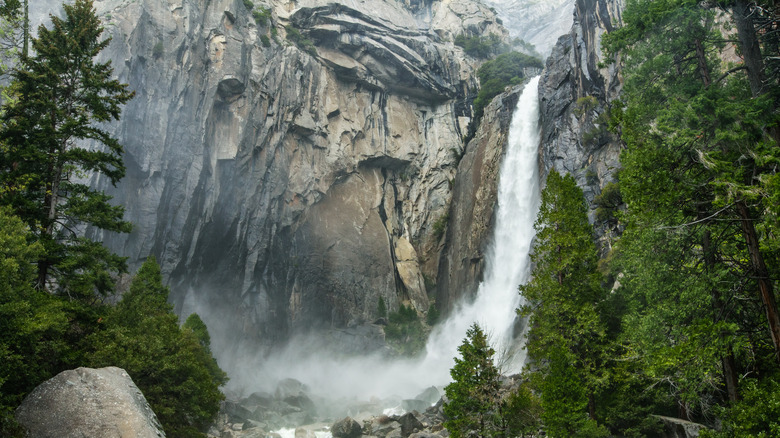
Nikolas_jkd/Getty Images
Yosemite National Park is renowned for its waterfalls, so a relatively painless hike to Lower Yosemite Falls is a must. It’s just west of Yosemite Village, and you can actually catch a glimpse of it from there. However, getting up close and personal will give you a better idea of this waterfall’s size. Lower Yosemite Falls is part of the continent’s tallest waterfall, and this segment alone is 320 feet long.
To get there, you’ll take the Lower Yosemite Fall Trailhead, which YosemiteHikes rates as easy. This trail is 0.5 miles round trip from the trailhead and 1.5 miles from Yosemite Village. When you reach the falls, you’ll see both the lower and upper parts. To observe it in its full glory, aim for spring and summer, as it’ll be roaring in those months. This will put you in the splash zone, so expect to get a little wet. Don’t worry too much if you can’t travel during these seasons, as the trail is open all year.
See Bridalveil Fall
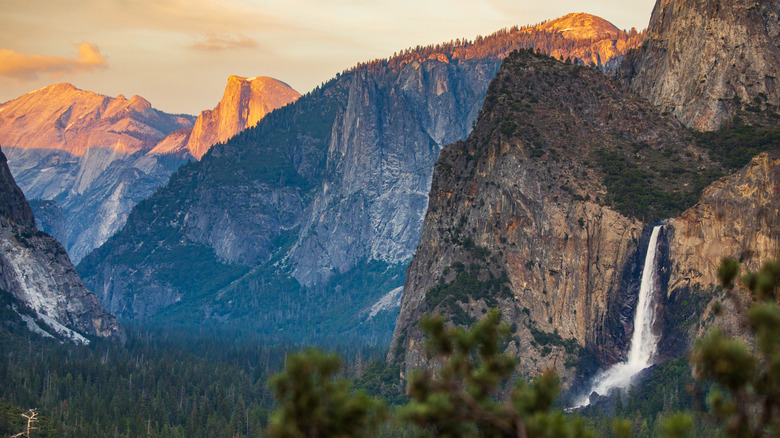
Philip Thurston/Getty Images
After seeing the tallest waterfall in North America, you should view one of the smallest in Yosemite National Park. However, don’t let the size of Bridalveil Falls fool you. It only stands 620 feet tall, but it’s grand and is one of the most prominent waterfalls here. For many of the park’s visitors, it’s the first fall they’ll encounter. You’ll instantly pick it out of all the others since it creates a mist with its waters.
Those who aren’t up for long and challenging hikes are in luck. Like the trail to Lower Yosemite Falls, it’s an easy one that’s only 1.2 miles round trip, and it should only take up to 30 minutes to get through. When Bridalveil Fall is most powerful in the spring, you should watch your steps while traversing the path. This area has been through an extensive rehabilitation project, which started in the fall of 2019. Work finished in the fall of 2023, meaning you’ll be one of the first visitors to have a better experience at Bridalveil Fall.
Walk the Sentinel and Cook’s Meadow Loop
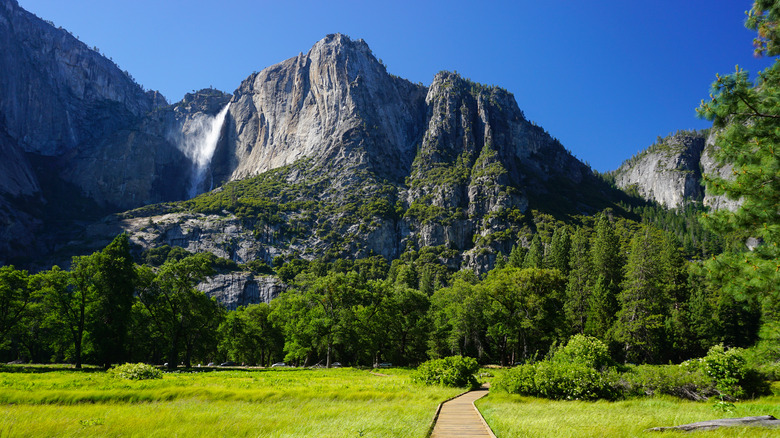
Alxcrs/Shutterstock
Packing in so many activities in one day can be tiring, but walking through Cook’s Meadow and Sentinel Meadow is a pleasant and effortless experience. Not only is the loop flat, but it’s also only 2.25 miles long. This makes it an excellent landmark to visit, and the outlook is stunning as well. From this space, you will be able to see some of the most breathtaking natural wonders in Yosemite National Park, such as Yosemite Falls, Half Dome, Glacier Point, and Sentinel Rock. All you have to do is follow the boardwalk, and the loop will take you through these different vantage points.
The boardwalk is wheelchair accessible, so all family members can join without exerting themselves or running into obstacles. Make sure you stand on Sentinel Bridge. It gives you the most outstanding view of Half Dome, where you might just witness people tackling one of the most dangerous hikes in the U.S. It’ll certainly make you happy to have both feet on the ground!
Check out Yosemite Valley Chapel
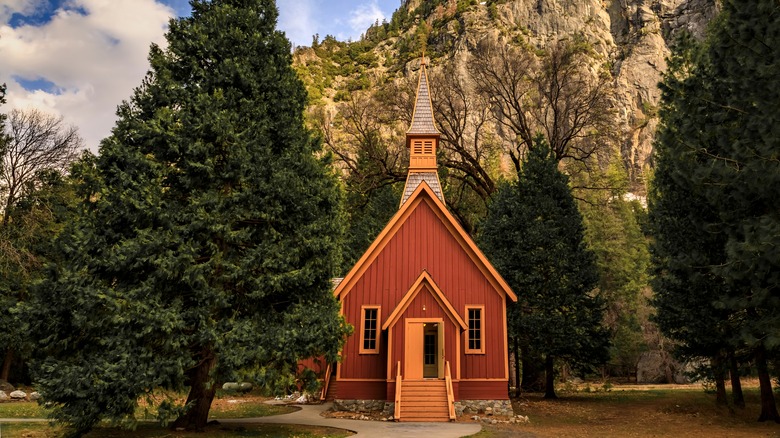
SvetlanaSF/Shutterstock
If you’re already at Sentinel Bridge, cross it to get to Yosemite Valley Chapel. This place of worship was built in 1879, and it’s now one of the oldest structures in public use in the park. A fun fact is that when President Grant died in 1887, the chapel held a memorial service for him, with Sir Arthur Sullivan and Sir William Gilbert (renowned musicians and composers) both present. Interestingly, Yosemite Valley Chapel didn’t always sit on the south side of Yosemite Valley, nestled in a corner. Originally, the chapel was built near the Four Mile trail. It was only moved to its current location in 1901 after all its surrounding buildings were torn down.
Today, the chapel is still in use, and many people come to tie the knot in the idyllic settings. And if you want somewhere peaceful to pray, you’re always welcome, as all denominations are welcome. Google Reviewer Genevieve Martinez says, “The fact that it’s located deep in Yosemite Park gives it an added sense of spirituality for me.”
Take a dip in the Merced River
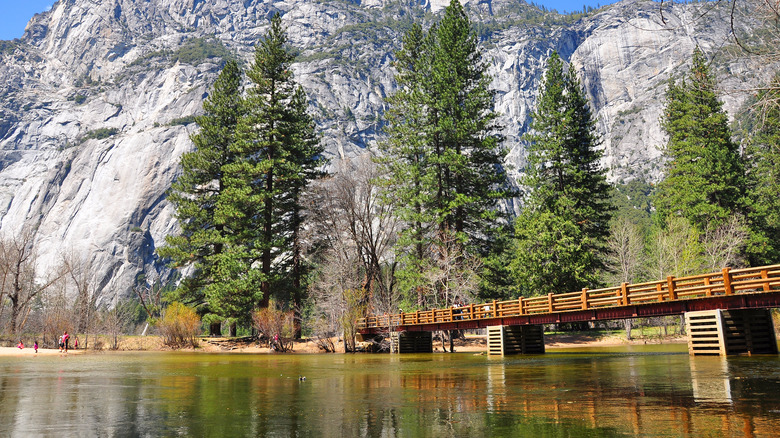
OLOS/Shutterstock
In California, it can be hot in the summer and even in the fall sometimes. After walking around for hours, you might be sweaty and desperate to cool off. What better way to do it than in the clear Merced River? A great place to take a dip is the Swinging Bridge picnic area. But before you get excited, you should know the bridge is no longer swinging. Though it initially did, it was replaced in 1964 after flooding damaged the wood. While this may dampen your excitement, it’s still a nice place to hang out.
The picnic area has plenty of tables where you can sit and have a meal with your loved ones. In addition, there are grills you can utilize to have a fresh and hot lunch. You can explore the area, swim in the water, and take turns manning the grill on a lazy afternoon.
See the fissures at Taft Point
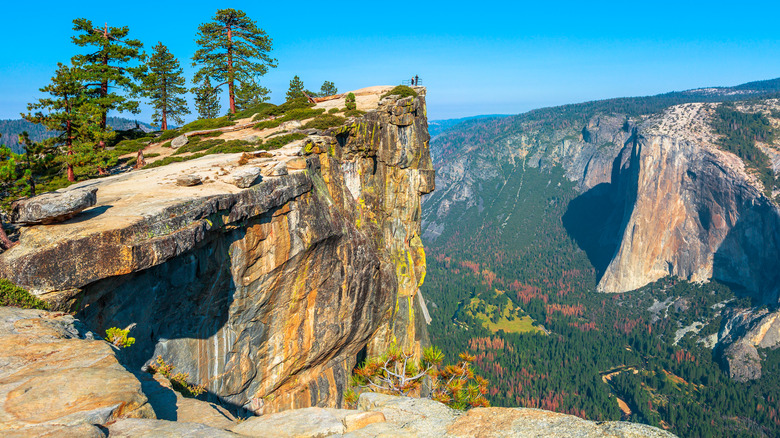
Benny Marty/Shutterstock
For a slightly harder hike, get up to Taft Point, which is not for the faint of heart. But the trek is easy to moderate for most people, and there isn’t much of an elevation change, which your legs will be thankful for. The trail is just over 2 miles long (round trip) and should take one to two hours to complete. However, there are no guard rails, and you’ll be on a tall cliff, making you feel dizzy, especially if you peer over the edge.
If you do make it up there, though, you’ll be rewarded with a breathtaking view of the north valley wall and Yosemite Falls. Bill Kerney on AllTrails says it’s “one of the most dramatic views in the world.” What’s interesting about Taft Point is it has fissures all over. As you make your way up the trail, you’ll see vertical slashes in the rocks. If you look down on some of them, it can also be harrowing.
Go rock climbing at El Capitan
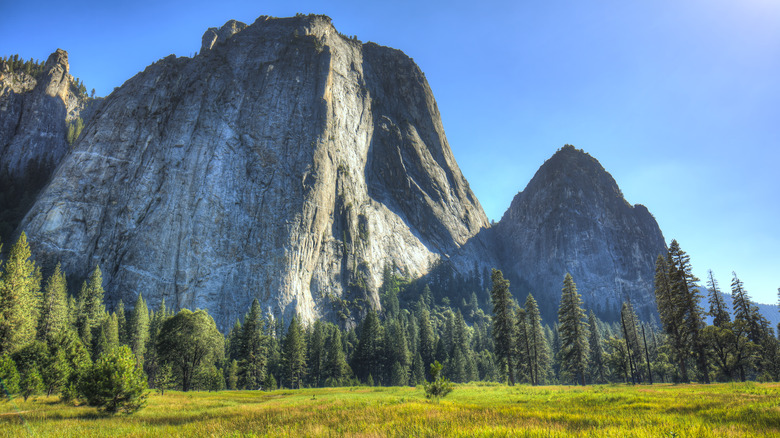
Pawel.gaul/Getty Images
Rock climbers will want to take on the challenge of El Capitan, which you may have seen in the Oscar-winning documentary “Free Solo.” These granite cliffs stand over 3,000 feet tall, and once you get to the top, you’ll feel the ultimate satisfaction knowing you’ve climbed the Eiffel Tower three times over. The best part is that you’ll have a fantastic perspective of the world below and capture unique pictures from that vantage point.
Not a fan of rock climbing? Then don’t worry; there’s another way not to miss out on El Capitan’s peak. The easiest way to get there is to drive, but you can also hike the El Capitan trail. As you may have guessed, though, it’s a tough one, as you’ll have to ascend over 3,000 feet. It’ll take 8 to 12 hours, but it’ll be a quiet hike with little crowds. Another option is to just people-watch. At the base of El Capitan is a picnic area where you can chow down and mentally cheer on the brave climbers.
Tackle Half Dome
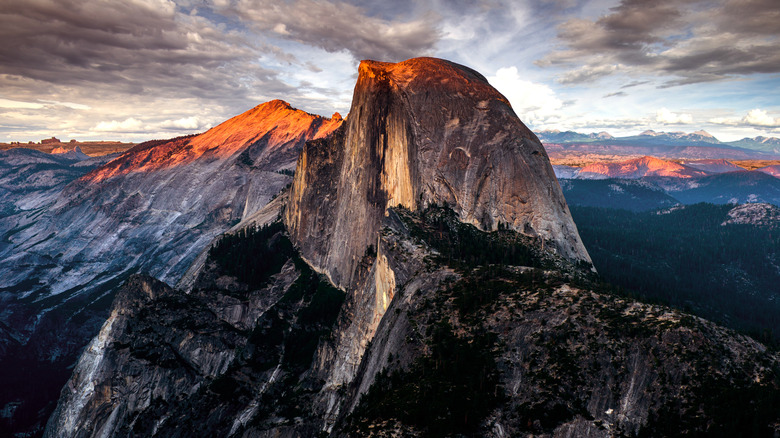
Pung/Shutterstock
Huge hiking enthusiasts should skip all the easy hikes and opt for Half Dome instead. However, be forewarned that it’ll take the whole day to conquer, as it’s a 14- to 16-mile round trip and will probably take 12 hours to complete. This will eat up your whole day, but if you’re prepared to sacrifice everything else for Half Dome, it’ll be time well spent. Make sure you’re in excellent shape before considering this journey. The NPS recommends bringing all necessities to ensure you’re prepared. These include proper footwear, gloves, and water. If you’re in Yosemite National Park between late May and mid-October, you can crush the last 400 feet of the climb on its famous cables.
As stated before, though, Half Dome is one of the most dangerous hikes in the country. Consequently, you may not want to take such huge risks on your vacation, nor do you want to spend all day at one landmark. So, if you want a good alternative, climb Cloud’s Rest instead. Not only will you see Half Dome anyway, but it’s a less dangerous hike and takes two-thirds of the time to complete.
Drive up to Glacier Point
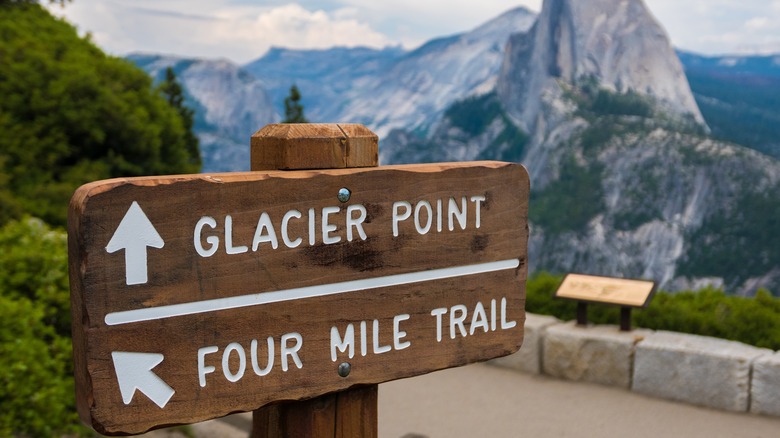
Tomas Nevesely/Shutterstock
Glacier Point is only open approximately half the year, from around May to November, depending on snowfall. If you’re fortunate enough to be in Yosemite National Park in that period, then a drive up to Glacier Point should be on the top of your to-do list. You’ll have a scenic and serene drive up there, and a panoramic view of Yosemite Valley and High Sierra peaks is waiting for you to soak it all in. It’s the perfect way to end your day since there’s no physical activity involved, and the sunset is dazzling.
Don’t be disappointed if you don’t have your driver’s license or no way to hitch a ride with someone. You can buy a one-way bus ticket to Glacier Point, but you’ll have to hike back to Yosemite Valley or vice versa. Those visiting between mid-December and March can cross-country ski there, too. Start your day early since it’ll span 10.5 miles.
Go stargazing
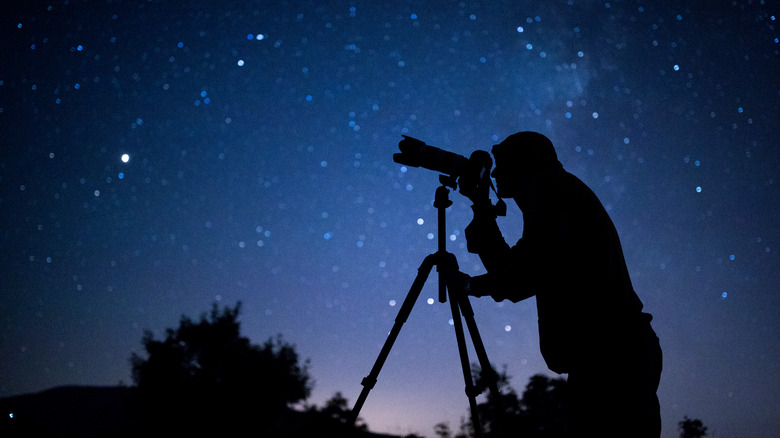
Bojanstory/Getty Images
Nowadays, we live in such light-polluted areas that we barely see any stars at night. As a result, we take these nighttime wonders for granted, and we barely think about what shines in the dark. To get reacquainted with these celestial objects, you should go stargazing in Yosemite National Park. The beauty of the park is that it has very little artificial light. This means the night skies are very clear, and it won’t be difficult to spot those twinkling stars and constellations. It’s handy to prep beforehand with a star chart or app on your phone.
Are you still struggling to identify them, or want to learn more? Then, you can find amateur astronomers at Glacier Point on Saturdays. Many will set up telescopes, and you may view the stars up close through them. In addition, there are astronomy walks and talks throughout various areas of the national park if you want to sign up for them.
Our methodology for picking these spots
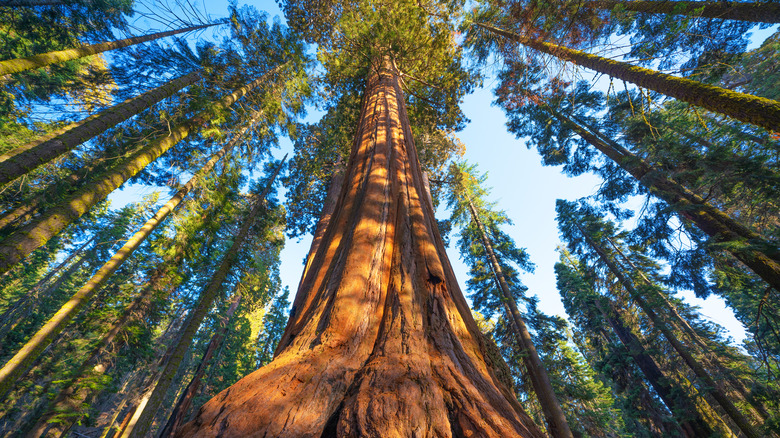
IM_photo/Shutterstock
We chose spots that are easily accessible and clustered near one another to make a one-day journey seamless and efficient. All points of interest also have stellar ratings from prior visitors.

